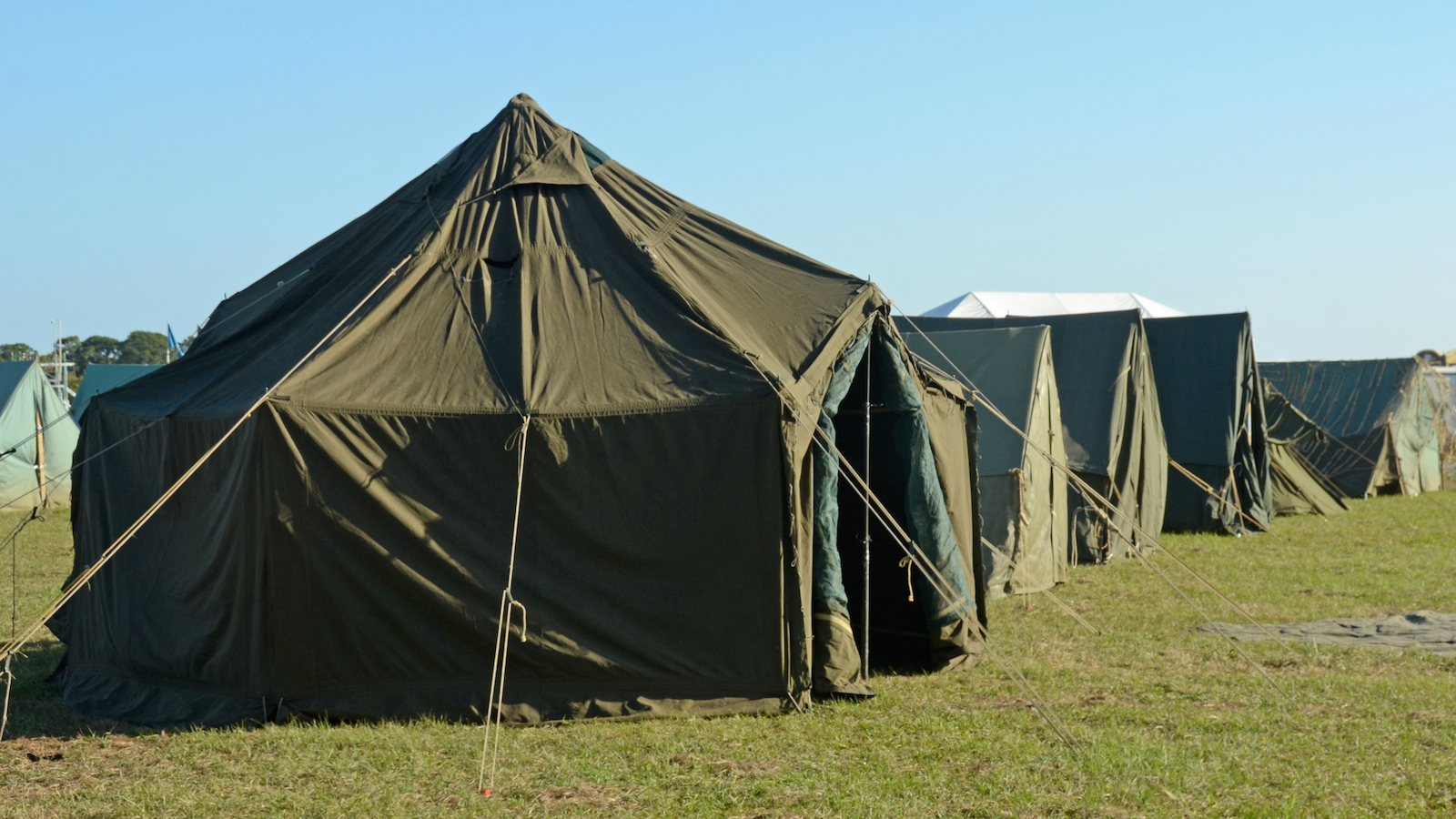Commentary on Parashat Ki Teitzei, Deuteronomy 21:10 - 25:19
Shortly, the people of Israel will begin its national life, including the conquest and settlement of the land. And when Israel goes to war, Moses teaches, the Torah continues to maintain its concern for sanctity:
(10) When you go out as a camp (mahaneh) against your enemies, you shall be on guard against any bad thing. (11) If there will be among you a man who will not be pure because of an incident of the night, he shall go forth outside of the camp (la’mahaneh); he shall not come inside the camp (ha’mahaneh). (Deut. 12) And it shall be towards evening, he shall wash in water, and when the sun has set he may come into the camp (ha’mahaneh). (Deut. 13) And a designated place shall you have for yourself outside of the camp (la’mahaneh), and you shall go there outside. (Deut. 14) And a spade shall you have for you with your implements; and it shall be when you sit outside, you shall dig with it, and you shall turn back and cover your discharge. (15) For Hashem, your G-d, walks in the midst of your camp (mahanecha), to save you and to deliver your enemies before you; and your camp(s) shall be (v’haya mahaneycha) holy; and He will not see in you any indecent thing, such that He will turn from behind you. (Deuteronomy 23)
Aside from the fact that the word mahaneh, camp is mentioned a significant seven times, this passage describes appropriate and inappropriate behavior in the military camp. However, it also sheds light on the general life of the society.
One who becomes impure (tamei) through emission is required to remain outside the precincts of the Tabernacle (or, in later history, the Temple); this is the camp spoken of in verses 11-12. Then, in verses 13-14, the focus is on cleanliness and maintaining the proper atmosphere in the military camp. Rambam (Maimonides), (Laws of Kings and Their Wars, 6:14, 15), explains these laws as follows:
It is forbidden to relieve oneself within the camp or in the field in any place. Rather there is a positive commandment to establish there a special path to relieve oneself there, as it says, “And a designated place shall you have for yourself outside of the camp.”
Likewise, there is a positive commandment for each one to have a spade suspended with his weapons. And he goes out along that path and he digs with it and turns and covers, as it is said, “And a spade shall you have for you with your implements…” And whether the ark is with them and whether there is no ark with them, so do they do always, as it is said, “and your camp(s) shall be holy.”
Ramban (Nahmanides) explains why we must be especially concerned with exercising self-control, and preventing coarseness and brutality during war:
It is known from the behavior of camps that go out to war that they eat every abomination, they rob and loot, and they are not ashamed even of adultery and every crime. The most naturally upright of men clothes himself in cruelty and rage against the enemy, and therefore the Scripture warns “you shall be on guard against any bad thing.”
In general, we are enjoined to do nothing that will drive the Shekhinah (divine presence) from our camp, for we need to turn to Hashem to lead us to victory, rather than rely on our own military strength. Therefore, says the Sifri (legal midrash on Numbers and Deuteronomy, 254), the introductory verse “you shall be on guard against any bad thing” extends this reminder to include all those observances that keep the Divine Presence in our midst, whether in war or in peace: Kashrut, morality and decency, and avoiding such sins as idolatry, wanton killing, blasphemy and gossip.
Mesheh Hokhmah (Meir Simcha of Dvinsk 1843-1926) adds that gossip is especially damaging in time of war, for divulging secret intelligence can cost many lives.
By the time we reach verse 15, the two connotations of mahaneh seem to blend together. Thus, the Talmud (Berakhot 25a) can derive from “and your camp(s) shall be holy” that any place of prayer must be clean and inoffensive both to sight and smell.
Ramban explains the connection:
For the entire camp is like the sanctuary of Hashem, and from it we extrapolate to the place of prayer. . . . It is forbidden to see [excrement] at the time of prayer and when the heart cleaves to Hashem, since repulsive things will produce disgrace in the soul and will disturb the intention of the pure heart, but when it disappears from the seeing eye there is no evil.
The fusing of the camps is reflected in the unusual spelling in the words “and your camp(s) shall be (v’haya mahaneycha) holy:” The verb is singular, however the spelling of the noun suggests plural. Nevertheless, Minhat Shai (Yedidya Shlomo Raphael b. Avraham of Norzi, 17th century) insists that this word is to be understood as singular, despite its plural spelling.
Rabbi Shimshon (Samson) Raphael Hirsch comments that all of Israel’s many “camps” are to be one:
What is said here primarily for military camps is, of course, meant to apply to any “camp,” to any sphere in which we may temporarily or permanently settle. All are to bear the stamp of a pure moral way of living. All the places where we live, not just our synagogues and schools, are not to lack consecration by thoughts of the mission of our life.
The battlefield is not the place to be divested of Torah values, rather it is actually their proving-ground. When the purity of all our camps is ensured by these values, then we are a unified nation.
Provided by the Orthodox Union, the central coordinating agency for North American Orthodox congregations.
ark
Pronounced: ark, Origin: English, the place in the synagogue where the Torah scrolls are stored, also known as the aron kodesh, or holy cabinet.
Avraham
Pronounced: AHVR-rah-ham, Origin: Hebrew, Abraham in the Torah, considered the first Jew.
Talmud
Pronounced: TALL-mud, Origin: Hebrew, the set of teachings and commentaries on the Torah that form the basis for Jewish law. Comprised of the Mishnah and the Gemara, it contains the opinions of thousands of rabbis from different periods in Jewish history.
Torah
Pronunced: TORE-uh, Origin: Hebrew, the Five Books of Moses.



